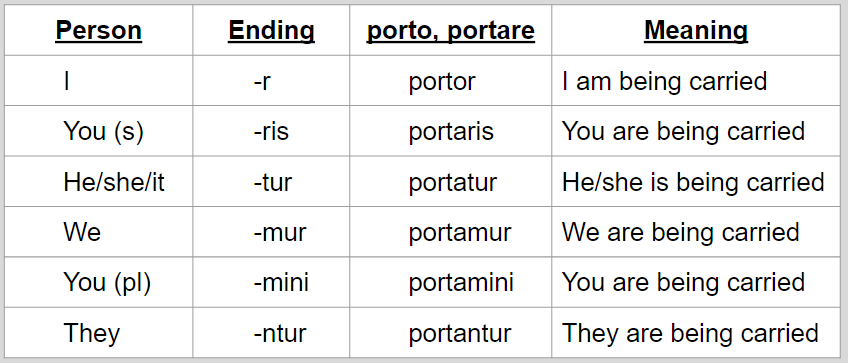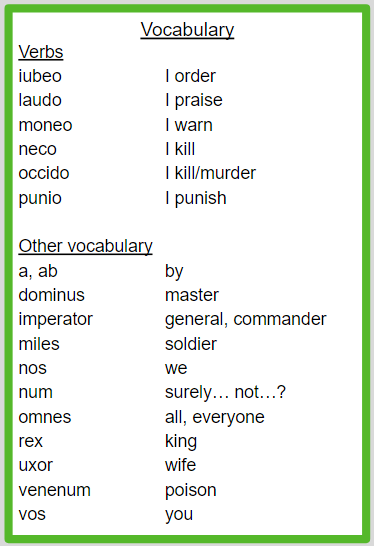Promoting the Present Passive
January Latin Challenge: Day 26 of 31
Welcome back to Day 26 of the bambasbat January Latin Challenge! Well done for getting this far - you are smashing it!
If you’ve just found this challenge, don’t worry - you can find all the previous posts here in the bambasbat archive.
Now, present passive verbs are verbs that are in the present tense, but in the passive voice, and they're actually really easy when you get down to it. Just like active verbs they're just a set of endings.
If you're not sure about any of your verb endings, download my Complete Reference Guide to Latin Verbs. It'd be great to have alongside you as you go through this post.
Active or passive?
Well, active verbs are where the nominative is doing the verb.
The boy kicks the horse.
The boy is the nominative. He's doing the verb.
A passive verb is when the grammatical nominative is having the verb done to it.
The boy is kicked by the horse.
The boy is still nominative, but his role has changed. He is now being kicked by the horse.
The boy is sort of “taking on” the action. He is passively accepting the action, hence the name.
Easy Endings
Present passives in Latin are really easy. It's the present stem, the normal stem that you've always used, and the passive endings.
You don't actually need the word being in your translation, but I find it often helps people to think of the passive idea of these verbs to keep “being” in there.
Passive Sentences
Use the table of endings above to double check who is doing each verb, and I've got vocab below, so you don't have to worry about that. You just need to be looking for the passive verbs and translating them logically.
Have a go on your own, and then read on when you are ready.
nos milites ab imperatoris laudamur.
regem necare iubeor.
dominus ab uxore veneno occiditur!
num vos punimini?
ab omnibus moneris.
Read on when ready!
nos milites ab imperatoris laudamur.
I know from my verb laudamur if I look at my table, -mur is the “we” ending. “We are being” something. Look at my vocab: “praised”.
Now nos goes with this. So nos laudamur, “we are being praised”.
I also get a little bit more information about us, because milites is plural nominative, so nos milites goes together.
ab imperatoris by the emperor or general.
“We soldiers are being praised by the general.”
Note: with these passive verbs you're often going to get what's called an ablative of agent. I will do a post on those in the future, but don't worry about them for now. They're indicated by a or ab, which means by.
regem necare iubeor.
Look at the verb first: iubeor. It is present passive. “I am being ordered”
Then I'm going to get an infinitive: necare. “I am ordered to kill”.
And finally, my accusative, “the king” regem.
“I am ordered to kill the king.”
dominus ab uxore veneno occiditur!
occiditur is my third person singular - he/she/it is being killed or murdered.
In this case it's my dominus, as he's my grammatical nominative.
Then I get two new pieces of information: ab uxore - so again, one of those ablatives of agent, “by the wife”. And then I also get veneno which is an ablative again, this one is an ablative of instrument, literally a thing that is being used to do the passive verb.
“The master is being killed by his wife with poison.”
num vos punimini?
num is one of my favourite question words (because I'm weird and have favourite question words). It means “surely not”. You're expecting the answer “no” as a response.
Then I need a verb: punimini, which is my favourite passive ending because again, I have favourite passive endings. It’s a second person plural ending: “you plural are being punished”.
vos just gives me more information. I know it is you plural, so I'm pointing, I'm being very clear about who I'm talking to.
“Surely you are not being punished?”
ab omnibus moneris.
moneris is a second person singular ending. “You are being warned”.
In this case, ab omnibus
“You are being warned by everyone.”
So that's present passives! They are really simple. It's just a case of learning those verb endings that are in the table, which are super easy once you get it in your head.
And yes everyone always says, “Oh no! Another round of verb tables to learn!”, but they're really, really simple. If you're struggling with any of these or you just want to have a little read ahead and look at all the verb tables, do go and download that complete reference guide.
Thanks for joining me for Day 26 of the Latin January Challenge. Tomorrow we will be looking at Imperfect Passive Verbs. Let me know what you think in the comments, especially if you have any questions, and I'll see you tomorrow on bambasbat!




